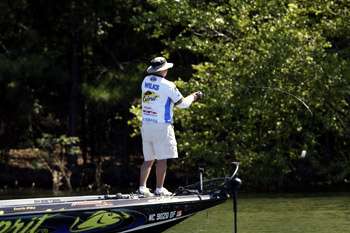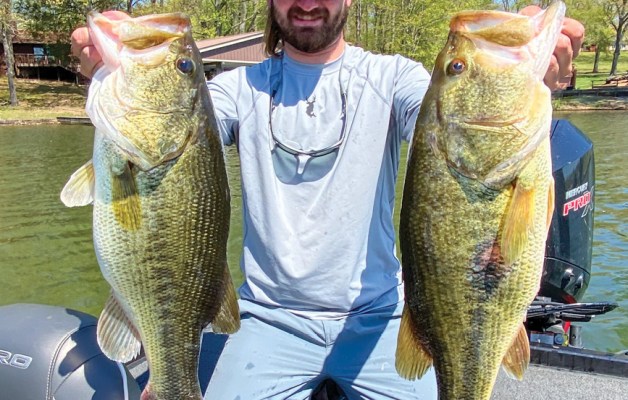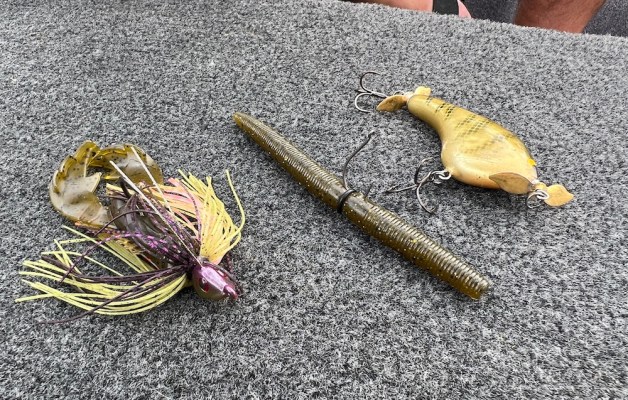
Small water doesn't mean small fish.
Given the size of many man-made reservoirs, it's easy to become frustrated when searching for bass, more so when it comes to big bass. It's impossible to cover all the water within a season on some of these giants, so instead of beating your head against the proverbial wall and burning tons of gas in futility, take some advice from Dustin Wilks and head for smaller waters.
"This time of year, the bass are exceptionally hard to find on huge reservoirs," the North Carolina pro says, "They're usually suspended and pretty active. They actually run and chase shad with the stripers. You always hear of striper fishermen getting the huge largemouths in the fall accidentally."
Rather than battle striper fishermen for trophy largemouth bass, Wilks goes against the grain and heads out on foot to local farm ponds.
Think small, catch big
"I'll find a farm pond. It's really the easiest thing to do," Wilks says, "The shad should be moving to the backs of creeks, and the smaller bass will be right there behind them, but the bigger ones will be out roaming around in open water."
While it's hard to determine how productive a pond will be, there are a few things to look for and one big one to avoid.
"Stay away from ponds that cows have direct access to — they'll mess it up pretty quickly. They overload the nutrients in there which depletes the oxygen and kills fish.
"It may take some scouting, but the best ponds are usually the ones that are not visible from the road or hard to get to. I'll also look for water with a green tint to it, which means it has some nutrients, but not too many."
Buzz 'em up
"I'd like to declare the last week in October 'National Buzzbait Week,'" Wilks says. "The water is cooler, and there is a sense of urgency among the fish to gorge before it turns cold. A lot of times, a buzzbait will turn up the biggest fish in the pond."
Wilks favors the buzzbait when the sky is overcast, breaking up the bait's unique composition. Wilks has his buzzbait days down to a science. A cloudy day four days after a front finds Wilks buzzing up the pond in a big way. His favorite places to throw the buzzbait are wind-blown flats or beaver huts, and he likes a steady retrieve.
Good vibrations
When the fish are lively and actively feeding, your best bet is to get in the mix with a good shad imitator, a lipless crankbait.
"I'll throw Daiwa's TD Vibrations lipless crankbait across the same flats I throw the buzzbait," he says.
Wilks also says he prefers a little wind when cranking. The murkier the water is, the brighter his bait choice is, and the clearer it gets, the more natural baits get the nod, like green shad. He'll use Daiwa's 3/8-ounce option if the water is clear, slightly stained or shallow, and the larger 5/8-ounce variety if the opposite conditions hold true.
Clean up
After he makes a pass around the pond with the buzzbait and the crankbait, Wilks will make another round with a 10- or 12-inch soft plastic Culprit worm.
"Worms are good for getting the ones that aren't active enough to chase the buzzbait or the crankbait. I call it a 'clean up' bait," he says.
If he spots any sort of cover, Wilks exploits the Texas rigged worm's weedlessness by tossing it to, along or on top of it.
"I'll toss these along the shallow flat where the creek comes in. There's usually not much drop in small ponds, but any depression — even six inches — can be considered structure, and is a prime spot for the worm," he says.
Gearing up
Wilks will use fairly stout tackle for all his pond work, allowing him to tear through grass and negotiate anything a fish may wrap his line around. He uses 20-pound-test fluorocarbon for worming and buzzbaits, and 15-pound-test for the lipless crankbait. All are cast with a Daiwa Steez 6.3:1 reel and Steez rod.
Rather than looking for the fabled "needle in the haystack," narrow your search to a single bale. It's in the numbers. When you've got less acreage to cover, your odds of nabbing a lunker is much higher.




